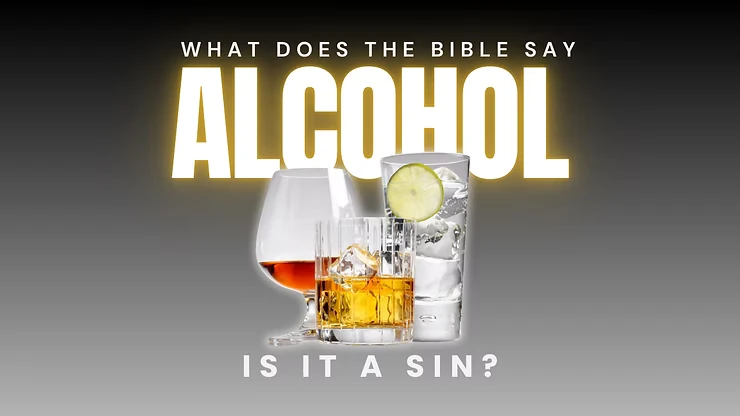
As a pastor for over 20 years, I’ve walked alongside people navigating the complexities of faith and life.
One topic that consistently sparks questions and diverse opinions is alcohol. I’ve seen the spectrum, from those who believe Christians should abstain entirely to those who advocate for responsible moderation. Add to that my own deeply personal journey, marked by both moments of perceived connection and the devastating consequences of alcohol’s misuse, and you’ll understand why I feel compelled to address this topic with raw honesty.
My story isn’t one of simple academic discussion. It’s etched in the reality of a 20-plus-year marriage that crumbled largely because of the influence of too much alcohol. I watched as ‘just one more glass’ turned into a constant craving, as ‘relax a little’ became a justification for overindulgence. I was often labeled ‘uptight’ or ‘too serious’ for expressing my concerns, and in a desperate attempt to bridge the growing divide, I sometimes crossed my own boundaries, drinking to win approval or recapture a fading connection.
I understand the pull of wanting to belong, to be accepted, and even desired. I’ve felt the shame and regret that comes with blurring the lines of moderation.

The pain of witnessing alcohol erode my marriage, culminating in my wife’s infidelity and the shattering of trust, is a burden I wouldn’t wish on anyone. It was a brutal awakening. After my divorce, I felt a profound prompting from God to confront my own relationship with alcohol.
Was it solely my ex-wife’s struggle, or had I also allowed it to become a crutch, a means of avoiding deeper issues? I made the conscious decision to abstain, initially for a few months, then a year, and now, over four years later, I can honestly say I haven’t missed it.
I share these intimate details not to elicit pity, but to provide context. My experiences have shaped my perspective, but I also strive to approach this topic with an open mind and a heart anchored in the unwavering truth of Scripture. I know that not everyone’s experience with alcohol is negative, but I also know the devastating power it can hold. So, let’s explore what the Bible really says about alcohol, and how those truths apply to our lives today.
What the Bible Says (and Doesn’t Say) About Alcohol:
The Bible offers a nuanced perspective on alcohol, acknowledging both its potential benefits and its inherent dangers.
The Good: Biblical Permissions
• Relief and Comfort (Proverbs 31:6-7): Scripture acknowledges that alcohol can offer temporary relief from distress. This isn’t an endorsement of using it as a long-term coping mechanism, but rather an understanding of its historical use in easing profound suffering.
• Medicinal and Hygienic Purposes (1 Timothy 5:23, Luke 10:34): In biblical times, wine was used for medicinal purposes and as a safer alternative to often contaminated water. This reminds us of its historical role in health and healing.
• Celebration and Fellowship (John 2:1-11, Ecclesiastes 9:7, Psalm 104:15): Jesus’ first miracle involved turning water into wine at a wedding, and other passages extol its role in celebrations. This shows that enjoying wine in moderation with friends and family during celebrations is not inherently sinful. The key is moderation and avoiding excess.
The Dangers: Warnings and Consequences
• Impaired Judgment and Damaged Relationships (Proverbs 20:1, 23:29-35, 31:4-5, Romans 14:21): The Bible consistently warns against the dangers of intoxication, which can lead to foolish behavior, conflict, and harm to others. Today, these warnings are incredibly relevant, seen in issues like drunk driving and broken families.
• Spiritual and Earthly Destruction (Ephesians 5:18, Galatians 5:21, 1 Peter 4:3): Drunkenness is condemned as ungodly behavior, leading to spiritual compromise and damaging one’s witness.
• The Cost of Misuse: Statistics from organizations like the National Institute on Alcohol Abuse and Alcoholism highlight the devastating impact of alcohol abuse on individuals, families, and society, underscoring the importance of responsible consumption and addressing addiction.
Key Biblical Principles for Modern Christians:
• Moderation vs. Drunkenness: The Bible’s consistent message is moderation, not total abstinence. What moderation means is a personal decision, often involving setting limits or even abstaining.
• Personal Responsibility and Conscience (Romans 14): We are called to be sensitive to the convictions of others. If drinking alcohol causes someone else to stumble or struggle, it’s best to abstain for their sake.
• Wisdom and Discernment (Proverbs): We are encouraged to avoid danger and temptation. This means exercising wisdom when it comes to alcohol, avoiding certain environments, setting boundaries, and seeking support.
Should Pastors and Church Leaders Drink Alcohol?
• Biblical Qualifications and Higher Accountability: While Scripture doesn’t demand total abstinence for leaders, those who teach and lead bear a heavier burden of accountability (James 3:1, Hebrews 13:17). Pastors are entrusted with spiritual well-being, and their actions carry significant influence. Their choices should prioritize spiritual integrity and the potential impact on their flock.
• Stumbling Blocks: For pastors, the concept of being a “stumbling block” (Romans 14:21) is especially relevant. Their actions can significantly influence those weaker in faith or struggling with addiction. Even if a pastor can drink responsibly, they must consider the potential impact on others, especially in public settings. Many churches and denominations have clear guidelines for their leaders in this area.
• Individual Conscience and Community Impact: While individual conscience is important, a pastor’s choices have a ripple effect within the community. In contexts where alcohol abuse is prevalent, even moderate drinking could send a harmful message. A pastor’s primary concern should be the spiritual health of their congregation, potentially requiring personal sacrifice for the sake of others.
As we navigate this complex topic, let’s remember that our ultimate goal is to honor God in all
we do and to love our neighbors as ourselves.
